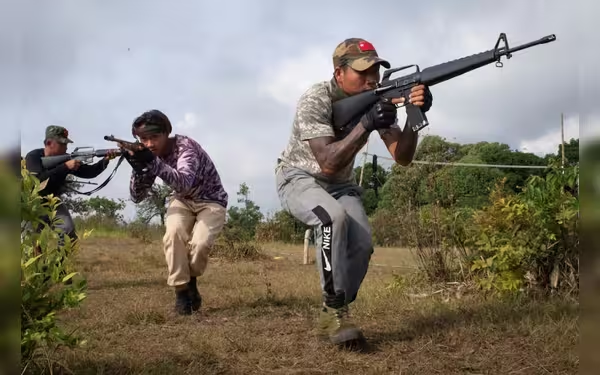Saturday, November 16, 2024 05:58 PM
China's Strategic Maneuvering in Myanmar's Political Landscape
- China plays both sides in Myanmar's conflict.
- Junta faces increasing pressure from ethnic resistance.
- China seeks to legitimize military influence through elections.
 Image Credits: asiatimes
Image Credits: asiatimesChina's involvement in Myanmar's junta highlights its strategic interests amid rising ethnic resistance.
Myanmar has been facing a challenging situation for quite some time now. The country is currently under the control of a military junta known as the State Administrative Council (SAC). This group has been struggling to maintain power, especially after suffering numerous defeats against various ethnic resistance organizations (EROs) and People’s Defense Forces (PDFs). As the situation unfolds, it seems that the collapse of the junta is becoming more likely. In this context, China’s increased involvement in Myanmar is not just a coincidence; it is a strategic move.
High-ranking Chinese officials have been visiting Myanmar frequently, and they have been meeting with leaders of the EROs. Additionally, invitations have been extended to Myanmar’s political elders to visit Beijing. All these actions indicate that China wants to keep Myanmar within its sphere of influence. Although China officially claims to follow a policy of non-interference in Myanmar’s internal matters, it is clear that the country is playing both sides of the conflict. This dual approach is aimed at protecting its own economic and security interests.
China, along with Russia, continues to supply arms to the junta, using its veto power at the United Nations to shield the regime from international criticism. At the same time, China is also providing support to several EROs that have been fighting against Myanmar’s military for greater autonomy. This indicates that China prefers a weakened SAC that can maintain control over central Myanmar while allowing the EROs to govern peripheral areas.
Furthermore, China seems to be looking for a way to legitimize this arrangement. One possible method is by facilitating elections where political parties aligned with armed groups can share seats in the national assembly. This would prioritize a ceasefire, even if it means ignoring the wishes of the majority of the Myanmar people, who want the military completely out of politics. They believe that the military's role should be limited to national defense only.
It is also important to note that China has been involved in various military operations in Myanmar. For instance, it is widely believed that China tacitly supported the launch of Operation 1027 by the Ta’ang National Liberation Army (TNLA), Myanmar National Democratic Alliance Army (MNDAA), and Arakan Army. However, China later sought to restrain these groups through the Haigeng Ceasefire Agreement, which it mediated.
The situation in Myanmar is complex and evolving. As the junta faces increasing pressure, China’s role becomes even more critical. While it may seem that China is trying to stabilize the region, its actions suggest a desire to maintain control over Myanmar’s political landscape for its own benefit. The future of Myanmar will depend not only on the internal dynamics of the country but also on how external powers like China choose to engage with the ongoing conflict. The people of Myanmar deserve a government that reflects their aspirations, free from military interference, and it remains to be seen whether this will be achieved in the near future.













